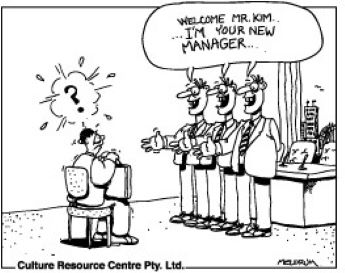Culture@Work
Welcome! My name is Joost Thissen and I am an Interculturalist. Here I share intercultural insights for those of us who work in culturally diverse and global workplaces.


Welcome! My name is Joost Thissen and I am an Interculturalist. Here I share intercultural insights for those of us who work in culturally diverse and global workplaces.


cultural column  Email This Post
Email This Post
During a training session for the Australian management team of an American multinational organisation, we talked about the matrix structure where a professional or a business unit can have two or sometimes three bosses. We also looked at cultural differences with regards to power holders, hierarchical relations and structures: these differences are considered to be difficult situations for cultures where people have an inner need to acknowledging power holders because of their hierarchical position.
My contact person contacted me a few weeks later to arrange that the whole department with representation in Sydney, Melbourne and New Zealand were now lined up to undergo the same cultural training. She laughed and said, “The money we invested in the first training session has already paid for itself”. The manager went on to explain, “Remember when you talked about the matrix structure? Our organisation has such a structure and now we understand how it has been holding us back from achieving our goals. For example, we have a Korean professional and although he is bright, a solid, and a very promising potential manager, we were very dissatisfied with his performance. We were on the verge of giving up on him: he seemed uncommitted, didn’t finish his work and was making promises that he didn’t keep. However, after your training session I sat down with his functional manager and we decided that one of us would back off for a while to explore if it was the matrix structure that was causing the problems. The changes have been dramatic, in the time that the Korean professional has been answering to one manager he has developed into the manager that we thought he could be; he is committed, shows loyalty and keeps his promises. He is now due for his promotion”.
This is an telling example of how the matrix structure does not seem to work at all efficiently for people from cultures where hierarchical positions are viewed differently from Australia or the USA: many cultures find it extremely confusing to report to more than one manager.
The more global organisations try to standardise and implement structures, procedures and tools, and export these across the globe to culturally diverse people, the more they will face problems. Have you ever considered that 360 performance reviews in which we expect our staff to review the performance of our bosses might cause immediate problems for people from hierarchical cultural backgrounds? What about Management by Objectives in which we expect staff to be able to sit down with a manager to openly discuss future objectives? Empowerment is another concept that is alien to many cultures across the globe… We have invested valuable time and money implementing these management concepts internationally not realising that we may actually be undermining the effectiveness of our organisations.
Globalisation does not mean that we simply teach other cultures what is best for them by doing it the ‘Head Office way”. Those organisations who actually understand the extent to which culture influences the way we structure and manage our teams, have the insight to work more effective.
A truly global organisation understands the value of creating effective work forces around the globe and use management concepts that are tailored to, and fit the specific cultures involved.
_________________________________________
Joost Thissen, Partner & Interculturalist
joost@cultureresourcecentre.com.au
cultural column  Email This Post
Email This Post